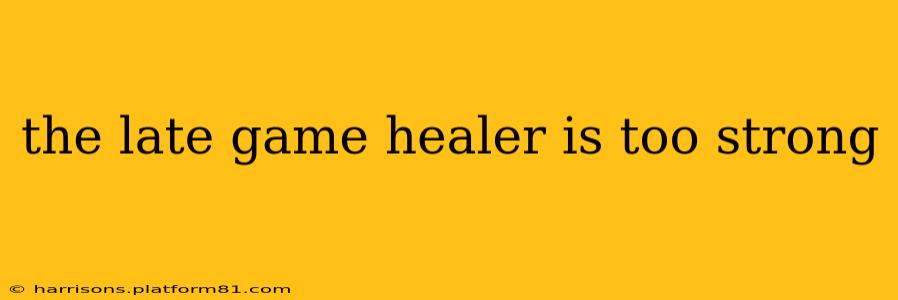The Late-Game Healer Meta: Overpowered or Just Effective?
The claim that late-game healers are "too strong" is a common refrain in many multiplayer online battle arena (MOBA) games, role-playing games (RPGs), and massively multiplayer online role-playing games (MMORPGs). This perception often sparks heated debates within gaming communities. But is this sentiment justified, or is it a matter of strategic counterplay and game balance? Let's delve into the complexities of late-game healer effectiveness and explore both sides of the argument.
What Makes Late-Game Healers Powerful?
Late-game healers, by definition, become exponentially more potent as the game progresses. Several factors contribute to this:
-
Scaling Abilities: Many healer abilities scale with factors like character level, ability rank, and item power. This means their healing output, shielding capabilities, and even offensive capabilities (some healers possess potent damage or crowd control) significantly increase over time.
-
Itemization: The later the game progresses, the more powerful items healers can afford. These items not only boost their healing but also enhance survivability and utility, making them incredibly difficult to eliminate.
-
Synergy with Team Composition: A well-built team often revolves around a strong late-game healer. Their consistent healing allows teammates to withstand significant damage, enabling aggressive playstyles and extended team fights.
-
Experience and Skill: Experienced players understand the nuances of healer roles, anticipating damage and proactively using abilities to maximize their team's survivability.
Are Late-Game Healers "Too Strong," or Is It a Balance Issue?
The question of whether late-game healers are "too strong" is subjective and depends heavily on several factors:
-
Game Design: Some games are inherently designed to favor late-game strategies, making powerful late-game healers a natural consequence of this design philosophy.
-
Opponent Skill: A skilled team can effectively counter a strong late-game healer through targeted focus fire, strategic positioning, and disruptive abilities. Poor counterplay often leads to the perception of over-powered healers.
-
Game Balance Patches: Game developers constantly adjust the balance of their games. Frequently, nerfs (reductions in power) to powerful healers are implemented in response to community feedback and game data.
Why do some players feel late-game healers are OP?
This feeling often stems from a frustrating experience:
-
Unwinnable Fights: When a late-game healer sustains their team, it can feel impossible to overcome them, leading to a sense of helplessness.
-
Lack of Counterplay: Without sufficient knowledge or resources, players may struggle to effectively counter the healer's impact.
-
Perceived Lack of Skill: Some players wrongly believe that effective healing requires little skill, ignoring the intricate decision-making and game sense needed to maximize a healer's impact.
How can you counter late-game healers effectively?
There are several strategies for mitigating the impact of powerful late-game healers:
-
Focus Fire: Prioritize eliminating the healer early in team fights to disrupt their healing output.
-
Disruption: Use crowd control abilities to interrupt the healer's casts, preventing crucial heals.
-
Burst Damage: Utilize high-burst damage abilities to quickly eliminate the healer before they can react.
-
Strategic Composition: Choose a team composition that can effectively counter the opposing team's healer, such as champions with high burst damage or strong anti-healing effects.
Conclusion:
The perceived power of late-game healers is a complex issue. While their effectiveness increases significantly as the game progresses, this isn't necessarily indicative of an imbalance. Effective counterplay, strategic team composition, and game balance adjustments all play crucial roles. Instead of simply labeling them as "too strong," a deeper understanding of their mechanics, counterplay strategies, and the overall game design is essential for a more nuanced perspective. The debate will likely continue, fueled by individual experiences and game specifics, making it a constantly evolving discussion within gaming communities.
